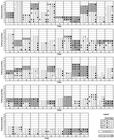Abstract
One of the measures to control visceral leishmaniosis (VL) in Brazil is the identification and culling of the canine reservoir. There is much controversy concerning this strategy, including the proper identification of positive dogs and the fact that the host-parasite relationship changes over time make it more challenging. A dynamic cohort of 62 dogs was followed every three months using serological and parasitological examinations and PCR. Positivity by PCR was higher than by serology and by parasitological examinations and showed a tendency to decrease over time, while serology tended to increase after six months. Concomitant positivity in all tests was observed in 10.4% of the samples, and negativity in 29.1%. Overall sensitivity ranged from 43.6 to 64.1%, and was not uniform over time. The proportion of dogs with or without clinical signs was not different by cytology or PCR but PCR was able to identify a larger number of asymptomatic dogs compared to ELISA and immunochromatography. PCR can be useful for surveillance of areas where cases of canine VL have not yet been detected and in which control strategies can be implemented to limit the spread of the disease. Despite the advance in diagnostic tools CVL diagnosis remains a challenge.
Keywords:
Cohort studies; diagnosis; Leishmania infantum chagasi; parasitological evaluation; PCR; serology

 Thumbnail
Thumbnail
 Thumbnail
Thumbnail

